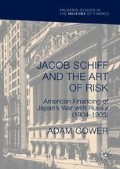Abstract
Prior to Jacob Schiff’s involvement in the Japanese loans, a syndicate of banks had coalesced in England with the as yet unfulfilled intent of financing Japan. Each of these banks had prior direct experience of working with the Japanese government. All were known to Schiff because he had worked with them before both directly and through personal contacts. Schiff knew them all to be highly reputable institutions within the London financial markets, and they all had extensive international banking experience. The importance of this network of relationships, how it worked, and its role in the financing of Japan, has previously either been understated or at least not very well explained.
Access this chapter
Tax calculation will be finalised at checkout
Purchases are for personal use only
Notes
- 1.
Norio Tamaki, Japanese Banking: A History, 1859–1959 (Studies in Macroeconomic History) (Cambridge: Cambridge University Press, 1995), p. 17.
- 2.
Ibid., p. 4.
- 3.
Ibid., p. 30.
- 4.
Collis, Wayfoong, p. 46.
- 5.
‘Imperial Japanese Government 5 Per Cent. Bonds’, HSBC-L: No. 21.
- 6.
‘Imperial Japanese Government 5% Bonds 1902’, HSBC-J.
- 7.
Tamaki, Japanese Banking, p. 13.
- 8.
Ibid., p. xiv.
- 9.
Metzler, Lever of Empire, p. 22.
- 10.
‘Statement by the Minister of Finance of Japan, Juichi Tsushima’, 9 May 1930, HSBC-L: No. 83.
- 11.
Letter from Schiff to President McKinley, 24 October 1902, as quoted in Adler, Jacob H. Schiff, Vol. 1, p. 274.
- 12.
Paolo Mauro, Nathan Sussman and Yishay Yafeh, Emerging Markets and Financial Globalization: Sovereign Bond Spreads in 1870–1913 and Today (Oxford: Oxford University Press, 2006), pp. 51–52.
- 13.
Ibid., pp. 51–52.
- 14.
Tamaki, Japanese Banking, p. 70.
- 15.
William Howarth, The Banks in the Clearing House (London: Effingham Wilson, 1905), p. 181.
- 16.
Ibid., p. 187.
- 17.
Johannes Hirschmeier and Tsunehiko Yui, The Development of Japanese Business 1600–1980 (London: George Allen & Unwin, 1981), p. 104.
- 18.
‘Alexander Shand’, Royal Bank of Scotland Heritage Online, http://heritagearchives.rbs.com/people/list/alexander-shand.html, accessed 31 December 2014.
- 19.
Olive Checkland and Norio Tamaki, ‘Alexander Allan Shand, 1844–1930: A Banker the Japanese Could Trust’, in Ian Nish (ed.), Britain and Japan: Biographical Portraits, Vol. 2 (Richmond: Japan Library, 1997), p. 67.
- 20.
In their chapter in Britain and Japan, Checkland and Tamaki make the case that, while Shand’s expertise was clearly his intimate knowledge of British banking practices, operations and theory, it was his sensitivity to Japanese cultural factors combined with a political astuteness that led to his rise in the hierarchy of banking in Japan. Checkland and Tamaki describe Shand’s political compatibility and support for a faction that was ultimately to prevail within the Japanese government, the ‘Choshu Initiative’, as a probable reason for his success in Japan. Checkland and Tamaki, ‘Alexander Allan Shand’.
- 21.
Alexander Allan Shand, Wataru Ebihara, Seiichi Umeura and Akimasa Yoshikawa, Ginko Boki Seiho (Tokyo: Okurasho, Meiji 6, 1873). See also Tamaki, Japanese Banking, p. 34. Shand’s interpreter and translator, Joseph Heco, born Hikozo Hamada (1837–1897), was the first Japanese national to be naturalized as a citizen of the USA.
- 22.
Letter from Viscount Shibusawa to Shand, 12 September 1927, RBS: Misc.
- 23.
Checkland and Tamaki, ‘Alexander Allan Shand’, p. 72.
- 24.
Tamaki, Japanese Banking, p. 93.
- 25.
Checkland and Tamaki, ‘Alexander Allan Shand’, p. 67.
- 26.
Tamaki, Japanese Banking, p. 95.
- 27.
Umekichi Yoneyama, Alexander A. Shand: A Friend of Nippon—Interesting Chapters from a Banker’s Reminiscences (Tokyo: Japan Times, 1927), pp. 2–10.
- 28.
Metzler, Lever of Empire, p. 11.
- 29.
Checkland and Tamaki, ‘Alexander Allan Shand’, p. 73.
- 30.
Ibid., p. 72.
- 31.
Letter from Viscount Shibusawa to Shand, 12 September 1927, RBS: Misc.
- 32.
Ibid.
- 33.
Norio Tamaki, ‘Shand, Alexander Allan (1844–1930), Banker’, Oxford Dictionary of National Biography (Oxford: Oxford University Press, 2008), http://www.oxforddnb.com/index/101053616/Alexander-Shand, accessed 4 August 2016. Shand received the Order of the Rising Sun, fourth class, in 1902; the Order of the Sacred Treasure, third class, in 1904; the Order of the Rising Sun, third class, in 1906; and the Order of the Sacred Treasure, second class, in 1908.
- 34.
[Obituary for A. A. Shand], The Times (16 April 1930), p. 16.
- 35.
Letter from Shand to Baring Brothers, 25 May 1904, BA: PF200187 HC 6.1.31.
- 36.
Checkland and Tamaki, ‘Alexander Allan Shand’, p. 76.
- 37.
Collis, Wayfoong, p. 40.
- 38.
Ibid., p. 48.
- 39.
‘Japanese Loans’, HSBC: HQLOH1 0002.
- 40.
Duncan H. Macintosh to A. M. Townsend, 23 July 1903, HSBC-C.
- 41.
‘Japanese 4½% Gold Loan, 1905 (2nd Series)’, HSBC-A.
- 42.
‘Allotment Sheet, Imperial Japanese Government 4% Sterling Loan, 1905’, HSBC-A.
- 43.
‘Japanese 4% Sterling Loan 1905, Brokerage’, HSBC-A.
- 44.
Ziegler, The Sixth Great Power, p. 294.
- 45.
Letter from Schiff to Wilson, 4 November 1872, JWP: 1872–98.
- 46.
Ziegler, The Sixth Great Power, p. 312.
- 47.
‘Extract from Letter from Lord Revelstoke to the Hon. H. Baring, dated 8 March 1904. Japanese Affairs’, BA: PF200187 HC 6.1.31.
- 48.
‘Memorandum of Conversation Held at 8 Bishopsgate, on 5 May 1904,—Present: Sir Ewen Cameron, Mr. Schiff & Lord Revelstoke’, BA: PF200187 HC 6.1.31.
- 49.
Ziegler, The Sixth Great Power, p. 311.
- 50.
‘Imperial Japanese Government 6% Sterling Loan, First Series, Statement of Commission Received’, BA: PF200187 HC 6.1.31.
- 51.
Ziegler, The Sixth Great Power, p. 312.
Author information
Authors and Affiliations
Corresponding author
Rights and permissions
Copyright information
© 2018 The Author(s)
About this chapter
Cite this chapter
Gower, A. (2018). The English Syndicate. In: Jacob Schiff and the Art of Risk. Palgrave Studies in the History of Finance. Palgrave Macmillan, Cham. https://doi.org/10.1007/978-3-319-90266-1_6
Download citation
DOI: https://doi.org/10.1007/978-3-319-90266-1_6
Published:
Publisher Name: Palgrave Macmillan, Cham
Print ISBN: 978-3-319-90265-4
Online ISBN: 978-3-319-90266-1
eBook Packages: Economics and FinanceEconomics and Finance (R0)

